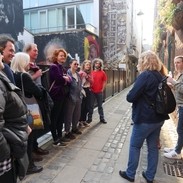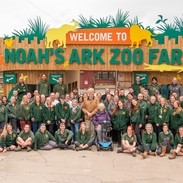Communicating with your customers during a flood event
Photo by: VisitBritain/Ryan Lomas

Follow our step-by-step guide to developing your communication strategy
Assess your situation, then contact your local tourism organisation to find out what communications they are developing. If you have no internet connection, speak to your broadband suppliers and your accredited Local Visitor Economy Partnership (LVEP), who will help you find a way to communicate.
1. What are your customers thinking?
News travels fast – and it isn’t always accurate. Media coverage of the weather can have a significant effect on how visitors perceive your destination. Even if your area has not been affected, always assume major storm or flood events will trigger significant concerns with customers that you need to address:
- Is your business still open?
- Can they access your business?
- Is it safe to visit?
- Are there still things to do when they visit?
- Will the quality and enjoyment of their visit be negatively affected?
Having identified what issues are likely to concern your visitors, the rest of this section shows how you can communicate with them to help address these concerns.
2. What should you say?
Base your messages and responses around those of the local DMO or trade association, but tailor them to your business and customers.
If your business is closed:
Compose a factual statement about what has happened and include:
- How long you might be closed (if you know)
- Alternative options for customers businesses or activities
- Your cancellation policy
- Opportunities to postpone visits and rearrange
If your business is open:
Develop a statement reassuring visitors you are open and include:
- Any travel/transport issues
- Attractions, facilities and activities that are open. Focus on the positive, but be realistic about any restrictions.
Keep information up to date:
- Make sure travel advice and updates on your website are easy to find, links work and information is up to date.
- Ensure your information is from a reliable source.
- Using a Question and Answer format as an easy way to order the information you provide. Keep it positive and stay on-message.
3. How should you say it?
Be honest and transparent
Customers expect an honest appraisal of the situation. Know the facts and don’t bluff. If you don’t know the latest situation get back to customers as soon as possible with facts from a reliable source.
Be clear
Use everyday language and be clear and concise. Don’t assume other people have the same level of knowledge about your business or destination as you have. They probably don’t know alternative routes to reach you, for example.
Be positive
You may feel angry, let down or unhappy about the situation, but you should communicate a clear and positive message. Stay on-message, focused and authentic.
4. Contact your customers
The majority of customers will be understanding, as long as you maintain a dialogue.
- Contact any customers who have booked and let them know the facts. Follow up with a phone call, if possible. Be honest - this is an opportunity to develop goodwill for your business and enhance your relationship with customers.
- Inform customers of any issues, closures or restrictions, and again when these are lifted. If you are closed, try to provide alternative arrangements or ensure you offer a good alternative so that the customer feels they are getting good service.
- If you are open, assure customers that there is still plenty to see and do, providing details of alternative activities. Be honest about any restrictions or closures.
- It is important the person making the call is well-informed about what is open/closed and comfortable handling difficult conversations. If your customers wish to re-book, ensure you can make the booking immediately.
- Keep longer-term customers informed about the situation – they may not be immediately affected, but they could still be concerned.
5. Contact your potential customers
You also need to think about future customers – people who may have been considering a visit but are worried and looking for reassurance.
- Your website, social media channels and media activity should all feature in your communications plan. (See our Digital Marketing Toolkit for help with using social media). Update all your channels regularly as the situation can change quickly. This will build confidence with potential customers.
- Be proactive on social media. It’s an opportunity to share updates and post images to counteract any extreme imagery that may be shown by the media. It all adds to help reassure potential visitors. Social media can also be useful to highlight activities and events still taking place, or promote offers. You can add links to local weather or travel sites. It’s a good way to spark conversations with supporters and potential customers and respond to any immediate concerns.
- If you have a local DMO or trade association, find out what #hashtag they are using for the flood or incident, then tag your posts, so you are part of the conversation. Keep your updates light and informative; use social media to talk about your business and businesses in your area. Show potential visitors there is an active community.
6. Working with the press
Writing a press release
After communicating with customers, it can be useful to write a press release and work with the media, during a flood crisis. A press release provides the opportunity to present your ’story’ in a clear and considered way. Before you start, make sure you have your key message prepared.
A press release should:
- Be factual – don’t speculate
- Provide contact details
- Be calm, reassuring and positive (avoid terms such as ’crisis’ and ’emergency’)
- Acknowledge responsibility to visitors and the community
- Indicate further information will be released as soon as it becomes available.
You may also consider
- Providing practical advice on travel/accommodation
- Emphasising areas that are unaffected
- Including expected recovery time
- Promoting activities not impacted
Promoting a positive story
During a crisis, the media will cover positive stories if they are newsworthy. This particularly applies to local media. Angles could include:
- Human interest stories, such as the community working together
- Examples of bucking the trend
- Adapting your offer to the situation (one hotel offers ‘storm watching’ breaks to drive business in the winter)
- Forward-bookings - if you have plenty of bookings, tell the media and your DMO, as it helps in maintaining a positive outlook.
Don’t take advantage:
If your business is lucky enough to be in an area unaffected by floods, avoid writing any releases which look like you are taking advantage of flooding elsewhere in the country.
Digital Marketing Toolkit
Get top tips on making the most of social media and your website content to communicate effectively with your customers.







